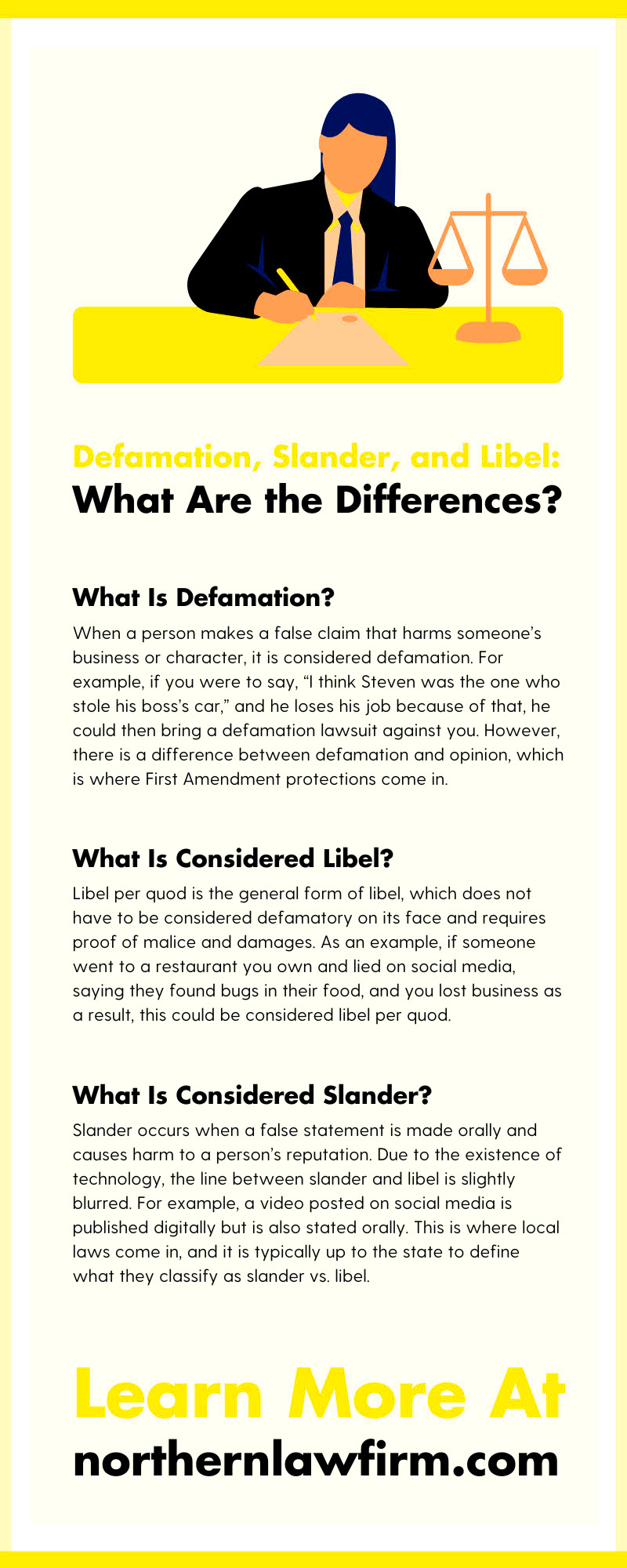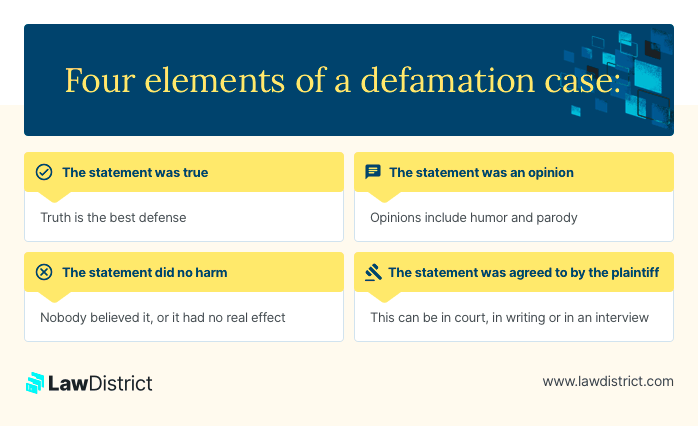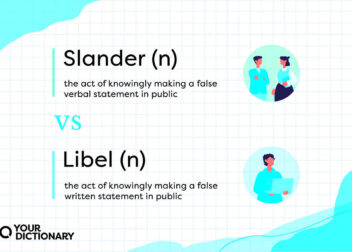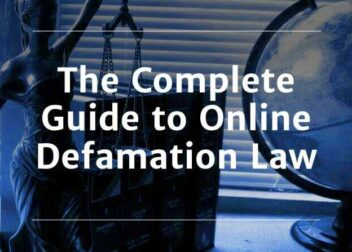Maryland Slander Laws and What Defamation Means
Defamation is a legal term that refers to making false statements about someone that damage their reputation. In Maryland, defamation laws protect individuals from harmful statements that can impact their personal and professional lives. Defamation can be classified into two categories: slander and libel. While both involve damaging statements, they differ in form and presentation. Let’s explore what makes slander unique in Maryland’s legal landscape.
What is Slander and How is it Different from Libel

Slander is a form of defamation that occurs when someone makes false spoken statements about another person. These statements must be made to a third party and can harm the person’s reputation or cause emotional distress. Here’s a quick breakdown:
- Slander: Spoken statements, usually made in person or via a medium like radio or television.
- Libel: Written or published statements, such as articles, social media posts, or books.
In Maryland, both slander and libel can result in legal action, but they are treated differently in court. For instance, proving slander often requires demonstrating the statement’s impact on the person’s life, while libel cases may focus on the published content itself. Understanding these differences is crucial for anyone considering legal action.
Elements of a Slander Claim in Maryland
To succeed in a slander claim in Maryland, a plaintiff must prove several key elements:
- False Statement: The statement made must be false. Truth is a complete defense to slander.
- Publication: The false statement must be made to at least one third party.
- Fault: The plaintiff must show that the defendant acted with negligence or actual malice.
- Harm: The plaintiff must demonstrate that the statement caused harm, such as damage to their reputation or emotional distress.
It’s important to note that in some cases, certain statements are considered slanderous per se, meaning they are inherently damaging and do not require proof of harm. Examples include accusations of a crime or statements that suggest someone has a contagious disease. Understanding these elements can help you assess the viability of a potential slander claim.
Proving Slander in a Legal Case
Proving slander in a legal case can be challenging, but understanding the necessary steps can make the process smoother. To establish a successful slander claim, you need to gather strong evidence and present a compelling argument. Here are some key factors to consider when proving slander:
- Documentation: Keep records of the slanderous statement. This can include written notes, audio recordings, or witness statements that confirm what was said.
- Witnesses: Identify any witnesses who heard the slanderous statement. Their testimonies can play a critical role in supporting your claim.
- Context: Understand the context in which the statement was made. Was it part of a public discussion, or was it made privately? The context can affect the impact of the statement.
- Intent: Show that the person who made the statement acted with negligence or actual malice. This means demonstrating that they knew the statement was false or acted with reckless disregard for the truth.
Finally, it’s important to consult with an experienced attorney who can help you navigate the complexities of slander laws and gather the necessary evidence to support your case. With the right approach, you can build a strong case for proving slander in Maryland.
Defenses Against Slander Claims
When facing a slander claim, there are several defenses that can be employed to protect against liability. Understanding these defenses is essential for anyone accused of making slanderous statements. Here are some common defenses:
- Truth: If the statement in question is true, it cannot be considered slanderous. Truth is an absolute defense.
- Opinion: Statements that are purely opinion and not based on fact may not qualify as slander. For example, saying “I think he’s a bad person” is typically seen as opinion.
- Privilege: Certain statements made in specific contexts, such as in court or during official proceedings, may be protected by privilege, meaning they cannot be deemed slanderous.
- Consent: If the person who is allegedly harmed consented to the statement being made, they may be unable to pursue a slander claim.
Each case is unique, and the appropriate defense will depend on the specific circumstances. Consulting with a legal professional can provide valuable insight into the best strategy for defending against slander claims.
Consequences of Slander in Maryland
The consequences of slander in Maryland can be significant, impacting both the person making the statement and the person being defamed. Here’s a closer look at the potential outcomes:
- Legal Penalties: If found liable for slander, defendants may face financial penalties, including compensatory and punitive damages awarded to the plaintiff.
- Reputation Damage: Accusations of slander can also damage the reputation of the person making the statement, leading to personal and professional repercussions.
- Emotional Distress: Victims of slander often experience emotional distress, which can lead to additional claims for damages based on mental anguish.
- Public Relations Issues: Being involved in a slander case can attract media attention, which may further harm reputations and relationships.
In summary, the consequences of slander are serious and can affect all parties involved. If you’re considering a slander claim or facing one, it’s crucial to understand these potential outcomes and seek legal guidance to navigate the situation effectively.
How to File a Slander Lawsuit in Maryland
Filing a slander lawsuit in Maryland involves a series of steps that can be complicated, but knowing what to expect can make it easier. If you believe you have a valid claim, here’s a straightforward process to guide you:
- Consult with an Attorney: Start by discussing your situation with a lawyer experienced in defamation cases. They can provide valuable insights and help you understand the strength of your claim.
- Gather Evidence: Collect all relevant evidence, including recordings, witness statements, and documentation of any damages you’ve suffered. This evidence is crucial for supporting your case.
- File a Complaint: Your attorney will draft and file a complaint with the appropriate Maryland court. This document outlines your claim and the damages you’re seeking.
- Serve the Defendant: Once the complaint is filed, the defendant must be officially notified of the lawsuit. This is usually done through a process server or sheriff.
- Prepare for Discovery: After the defendant responds, both parties will exchange evidence and information in a process called discovery. This stage is essential for building your case.
- Trial or Settlement: Most cases are settled before trial, but if yours goes to court, be prepared to present your case to a judge or jury.
Each of these steps requires careful attention to detail, and having an attorney by your side can make a significant difference in navigating the process successfully.
Common Questions About Slander Laws in Maryland
Many people have questions about slander laws and what they mean for them. Here are some common inquiries and their answers:
- What qualifies as slander? Slander refers to false spoken statements that harm someone’s reputation. If someone hears a damaging statement that is untrue, it could be considered slander.
- How long do I have to file a slander lawsuit? In Maryland, the statute of limitations for filing a slander claim is generally one year from the date of the incident.
- Can I sue for slander if the statement was made in private? Yes, as long as the statement was heard by a third party, it can qualify as slander, even if it was not made publicly.
- What damages can I recover in a slander case? Victims of slander can seek compensatory damages for lost income, emotional distress, and any other harm suffered due to the false statements.
- Is it necessary to prove actual harm? While proving harm is essential, in some cases, statements considered slanderous per se may not require proof of harm.
If you have more questions about slander laws in Maryland, it’s always a good idea to reach out to a legal professional who can provide personalized advice.
Conclusion
Understanding slander laws in Maryland is essential for anyone who feels they’ve been wronged by false statements. From knowing how to file a lawsuit to understanding the elements of a slander claim, being informed can empower you to take action. Remember, slander can have serious consequences for both parties involved, so seeking legal guidance is crucial. If you think you might have a case, don’t hesitate to consult with a lawyer to protect your rights and reputation. With the right information and support, you can navigate the complexities of slander laws effectively.
Frequently Asked Questions
When it comes to slander and defamation laws, many people have questions. Here are some of the most frequently asked questions that can help clarify these important topics:
- What is the difference between slander and libel?Slander involves false spoken statements that harm someone’s reputation, while libel refers to written or published false statements. Both are forms of defamation, but the medium of communication distinguishes them.
- How do I prove slander?To prove slander, you must establish that a false statement was made, published to a third party, and that it caused harm to your reputation. Evidence such as witness testimonies, recordings, and documentation of damages is crucial.
- Is it necessary to prove actual damages?In Maryland, actual damages must generally be proven in slander cases, unless the statement is considered slanderous per se. In such cases, damages are assumed due to the nature of the statement.
- What defenses are available against slander claims?Common defenses include proving the truth of the statement, demonstrating that the statement was an opinion rather than a fact, and showing that the statement was made in a privileged context (such as in court).
- How long do I have to file a slander lawsuit in Maryland?You generally have one year from the date of the slanderous statement to file a lawsuit in Maryland. It’s important to act quickly to preserve your rights.
- Can I sue for slander if the statement was made online?Yes, online statements can be considered slanderous if they are spoken or implied in a way that harms your reputation. Depending on the platform, this could also fall under libel laws.
If you have further questions about slander laws or need specific legal advice, it’s always a good idea to consult with an attorney who specializes in defamation cases. Understanding your rights can help you navigate these complex situations more effectively.


